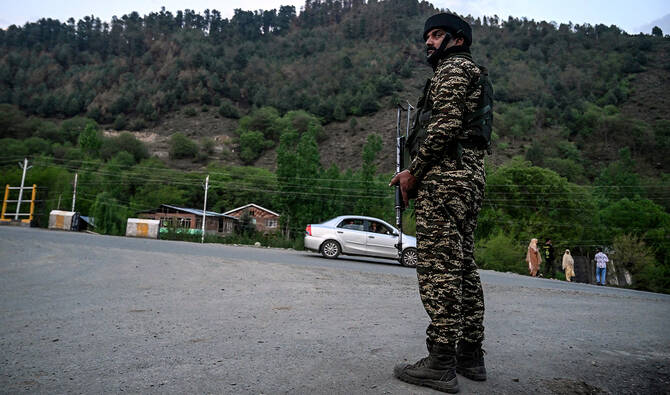SRINAGAR, India: Many people are feared to have died after gunmen indiscriminately fired at tourists in Indian-controlled Kashmir on Tuesday, officials said.
Police have described the incident as a “terror attack” and blamed militants fighting against Indian rule.
“This attack is much larger than anything we’ve seen directed at civilians in recent years,” Omar Abdullah, the region’s top elected official, wrote on social media.
“The death toll is still being ascertained so I don’t want to get into those details,” he said.
Initial reports said shots were fired at mostly Indian tourists visiting Baisaran meadow, some 5 kilometers (3 miles) from the disputed region’s resort town of Pahalgam.
Police and officials said tourists with gunshot wounds were evacuated to local hospitals.
The scene of the attack was cordoned off as police launched an operation to track down the attackers.
India’s home minister, Amit Shah, is heading to Srinagar, the main city in Indian-controlled Kashmir, where he said he would review the situation. Prime Minister Narendra Modi, who is on an official visit in Saudi Arabia, has been briefed about the incident, Shah said.
“We will come down heavily on the perpetrators with the harshest consequences,” Shah wrote in a post on the X social media platform.
Mirwaiz Umar Farooq, a key Kashmiri resistance leader, condemned what he described as a “cowardly attack on tourists.”
“Such violence is unacceptable and against the ethos of Kashmir which welcomes visitors with love and warmth. Condemn it strongly,” he wrote on X.
The attack coincided with the visit to India of US Vice President JD Vance, who is on a largely personal four-day visit.
The meadow in Pahalgam is a popular sightseeing destination, surrounded by snow-capped mountains and dotted with pine forests. It is visited by hundreds of tourists every day.
Nuclear-armed rivals India and Pakistan each administer part of Kashmir, but both claim the territory in its entirety.
Tuesday’s attack seems to be a major shift in the regional conflict where tourists for many years have largely been spared from violence despite a spate of targeted killings of Hindus, including immigrant workers from Indian states, after New Delhi ended the region’s semi-autonomy in 2019 and drastically curbed dissent, civil liberties and media freedoms.
Tensions have been simmering ever since as India has intensified its counterinsurgency operations.
The region, known for rolling Himalayan foothills, exquisitely decorated houseboats and pristine meadows, has also become a major domestic tourist destination, with hotels booked out for months. Kashmir has also drawn millions of visitors, who enjoy a strange peace kept by ubiquitous security checkpoints, armored vehicles and patrolling soldiers.
Although violence has ebbed in recent times in Kashmir Valley, the heart of anti-India rebellion, fighting between government forces and rebels has largely shifted to remote areas of Jammu region including Rajouri, Poonch and Kathua, where Indian troops have faced deadly attacks.
Militants in the Indian-controlled portion of Kashmir have been fighting New Delhi’s rule since 1989. Many Muslim Kashmiris support the rebels’ goal of uniting the territory, either under Pakistani rule or as an independent country.
India insists the Kashmir militancy is Pakistan-sponsored “terrorism.” Pakistan denies the charge, and many Kashmiris consider it a legitimate freedom struggle. Tens of thousands of civilians, rebels and government forces have been killed in the conflict.
























